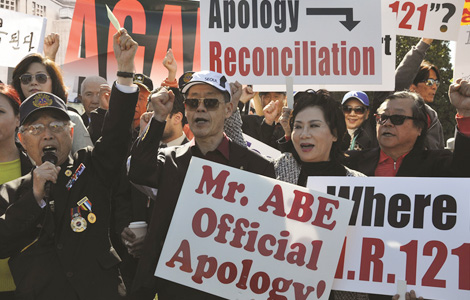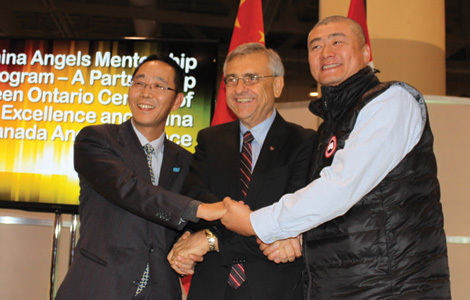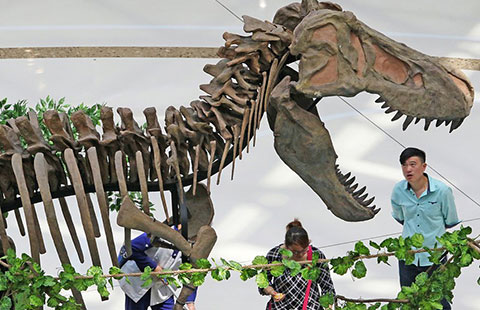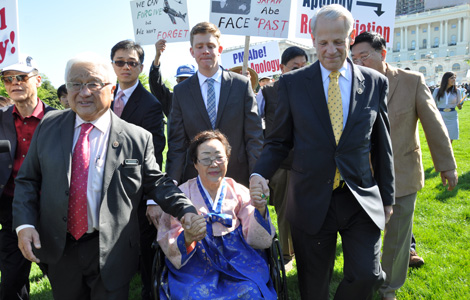SAR's 'super-connector' role a key staying power
Updated: 2015-04-23 07:29
By Luo Weiteng in Hong Kong(HK Edition)
|
||||||||
Bob Partridge, Greater China transaction advisory services leader at Ernst & Young, says: "Geographically, Hong Kong is centrally located, midway between North Asian and Southeast Asian countries, and is the main entry and exit point for trade with the world's second-largest economy, backed by excellent infrastructure in terms of a Grade-A international airport and container terminal."
Hong Kong's unique asset as a launching pad to other Asian markets can be seen from its position as the world's eighth-largest trading entity in goods in 2014, the seventh-largest importer and the ninth-largest exporter.
As an important link and a "super-connector" between the Chinese mainland and the world, Hong Kong can easily see you off to almost half of the world's population in a matter of hours," says Hong Kong Trade Development Council (HKTDC) principal economist Daniel Poon Wing-choi.

Foreign investors stand to reap the benefits from the world's manufacturing powerhouse - the Greater Pearl River Delta.
"We have a strong backup from the mainland. Singapore, in that sense, is somewhat isolated in the region," says Freeman Wong Shu-kin, general manager of Hong Kong-based Momax Technology (HK) Ltd, a mobile device accessories firm with a factory and warehouse in Shenzhen.
"We have a respected legal system, low, simple taxation, a well-established financial network, free trade and free information flow, coupled with sophisticated intellectual-property protection, a comprehensive services sector and a well-educated workforce," says Derek Lee Wai-ching, a partner at PricewaterhouseCoopers' (PwC) regional customs and international trade and world trade management services.
Besides, Hong Kong is a world-renowned free-trade port basically without customs duty, sales tax and value-added tax, and has one of the lowest corporate tax rates in Asia and internationally, at 16.5 percent, Poon said.
Hong Kong's comprehensive services sector accounts for 92 percent of GDP, he says, adding that the sector offers solid accounting, legal and financial support for more than 100,000 local and international trading companies with offices here.
More importantly, the city's well-educated workforce helps Hong Kong sell itself as a base for companies wishing to do business in the region.
"When launching our office in Shanghai, we had difficulties in finding enough local foreign trade talents to make up a team," recalls Ivan Lo Siu-wing, director of Hong Kong-based trading firm Inno Lifestyles Ltd.
However, Hong Kong has been going the extra mile to retain its competitive edge in the Asia Pacific amid a mounting threat from regional economies.
Moreover, with the growing trend of direct dealing between customers and manufacturers, known as "trade disintermediation", Hong Kong has to live with a more challenging business environment.
HKTDC's Poon believes that large multinational companies can afford to bypass Hong Kong to do business directly with the mainland, although small- and medium-sized enterprises, which dominate Western markets but lack thorough understanding of the mainland, still need Hong Kong as a gateway.
The faltering growth in developed economies has led Western companies to switch their focus to overseas markets, thus fueling the urge to troop into the vast mainland market. "That's where we come in," he says.
Poon believes the city can ride out the current wave of mainland enterprises "going global".
However, such initiatives are taking on a new dimension - from acquiring natural resources to acquiring third- and forth-tier brands overseas - and this is where Hong Kong could act as a testing ground or springboard for their overseas expansion aims, while offering a comprehensive package of accounting, financing and legal back-up services, he adds.
Still, to make the city tick and help ward off potential threats, Hong Kong needs to update and redefine its regional role, says Partridge at Ernst & Young, adding that efforts should also be made to extend the city's value chain, from its comfort zone OEM (Original Equipment Manufacturer) to ODM (Original Design Manufacturer) and OBM (Original Brand Manufacturer).
Poon further notes that there are some emerging product sectors where Hong Kong could build on its new advantages, adding that the city should go well beyond its traditional export items to explore market potential for baby and pet products, as well as products catering to an aging population.
Having seen negotiations on a Free Trade Agreement (FTA) between Hong Kong and ASEAN (the Association of Southeast Asian Nations) launched in July last year, and the FTA with Chile coming into effect last October, PwC's Lee believes that the government could do more to foster the city's trading business by facilitating more FTAs.
He wants the government to start creating a single platform to deal with all trade-related licensing.
Such a facility - something the World Trade Organization has long been encouraging countries to implement - could serve as an incentive for foreign companies keen to do business with or in Hong Kong, he says.
sophia@chinadailyhk.com

 Across America over the week (from April 24 to 30)
Across America over the week (from April 24 to 30)
 Across Canada (May 1)
Across Canada (May 1)
 China's top 10 GDP provinces in Q1
China's top 10 GDP provinces in Q1
 Photos capture marvelous landscapes of China
Photos capture marvelous landscapes of China
 Mass exodus from Kathmandu
Mass exodus from Kathmandu
 Running on water: a nearly impossible feat
Running on water: a nearly impossible feat
 Ten photos you don't wanna miss - April 30
Ten photos you don't wanna miss - April 30
 'Comfort women' survivor attends protest of Japan PM
'Comfort women' survivor attends protest of Japan PM
Most Viewed
Editor's Picks

|

|

|

|

|

|
Today's Top News
Abe protests continue in SF
Abe betrays history's conscience
The 'nightmare' everyone saw coming
Vancouver property developer identified as Chinese fugitive: report
Freddie Gray tried to hurt himself in police van
China trainmakers seek control of Bombardier's rail unit
New rich set sights on tech, media and telecom sectors
US rapped for stance on Japan
US Weekly

|

|







